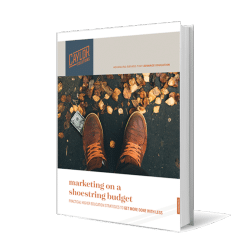Pay-per-click ads do work… when done right and for the right strategic reasons.
Here are 5 questions every higher education marketer should ask themselves to determine if they’re ready to jump into search engine marketing.
There are typically two responses marketers with no experience in pay-per-click (PPC) advertising have before their first campaign:
- Uncontrolled optimism that PPC is the advertising cure-all they’ve been looking for, or
- Unbridled fear that they’re going to spend all their budget on a losing gamble.
And depending on your past experience with search engine marketing, you might find yourself fluctuating between those two feelings. However, colleges and universities should definitely have a well planned strategy that uses both organic and paid search engine marketing strategies.
While pay-per-click ad strategies aren’t a guaranteed route to success, the fact that companies in almost every industry are using PPC shows that it’s a viable marketing option for higher education institutions.
According to popular search engine marketing blog Search Engine Land, pay-per-click ads are generating a solid income stream for businesses in almost every sector.
In fact, according to the Interactive Advertising Bureau (IAB) report, search ads accounted for $9.1 billion, or 39 percent, of the total Internet advertising revenue for the first half of 2014. When including mobile-related search revenue, search ads totaled $11.8 billion in revenue.
If you’re feeling a bit nervous at the idea of jumping into the pay-per-click waters, let not your heart be troubled. There’s good reason to consider an investment in PPC (11.8 billion of them, to be exact!)
These companies who are spending on search ads do so because they’re seeing results. So if you’re holding back due to nervousness, maybe it’s time to step out into the water.
But how can you know if it’s the right time for you to add a pay-per-click ad strategy to your marketing mix?
Here’s a list of questions that will help guide you to the right answer for you and your organization.
1. Do you have the budget?
Even though a properly executed PPC ad campaign can yield lucrative results for your college or university, it is not where you want to spend your payroll money. Pay-per-click is an investment. You should only use investment capital that you don’t need for critical operational, recruitment, and fundraising expenses.
But when you have a budget for PPC, you can set that budget for each of your campaigns. In other words, you can set an automatic kill switch to turn off your ad campaign when it reaches your budget’s limits.
This doesn’t mean that you need a Coca-Cola sized advertising budget to see good results with PPC.
Budgets can be as small or as big as needed – but ROI will be based upon the investment. I have seen somewhat successful campaigns for less than $500 per month, but remember, those are often more brand awareness campaigns than true lead generation.
2. Do you need to test your current conversion rates?
To test your website’s conversion rates, you’ve got to have considerable traffic, or the test will be faulty.
Pay-per-click advertising can generate a sizable spike in traffic to your site. And with the increased traffic volume, you can then properly test your website’s conversion rates.
PRO TIP: Pay-per-click campaigns ONLY work if they are combined with smart landing pages.
Don’t use paid ads to bring traffic to your “front door” (i.e., homepage). You need to put them in the controlled environment of a landing page, with limited options of engagement. Don’t let them wander and avoid signing up – which will mean low conversion.
3. How competitive are search engine results pages in your educational niche?
Organic search strategies like SEO are great ways to get on the top of search results list pages. But if your higher education niche is highly competitive, it might be extremely difficult to beat out other universities that dominate the search results page.
Pay-per-click ads can give you the perfect solution to this problem. Paying for search engine ads can get your brand in front of web users even if you don’t have as much brand authority as other higher education institutions.
4. Do you want to improve your SEO?
Believe it or not, PPC ads can, in some cases, improve organic search engine optimization results.
For example, if you need to find the right keyword or set of keywords that convert well for your audience, then PPC ad campaigns can help you find them faster and with greater accuracy.
5. Are you launching a new program, degree, or fundraising campaign?
As a strategy, SEO needs time to produce results. In the long run, SEO is an amazing investment that will keep your website coming up again and again in search engine results.
But when you open a new program, degree, or campaign, you don’t have time to wait for the results to come pouring in.
PPC ads can give your latest marketing campaign the boost it needs to bring in the right volume of traffic for success.
Bottom line: Higher education marketers should invest in pay-per-click ads – but at the right time.
You shouldn’t jump into PPC just because everyone else is doing it. And you shouldn’t launch a PPC campaign just because you’ve got the money for it.
But there are really good reasons to invest in a properly planned PPC strategy.
And if you need help to evaluate your current search engine marketing strategy, contact us today for a free consultation. We’ll be happy to put our decades of experience to work to get you the search engine rankings you’re looking for.
Market More. Spend Less.
Set yourself free from your shrinking marketing budget with my popular ebook Marketing on a Shoestring Budget! This ebook is jammed with practical ways to produce high-quality marketing on the cheap.
Inside, I’ll show you proven marketing tactics like…
-
- How to leverage low-cost technologies to reach your target market,
- How to craft a content marketing strategy on a bare-bones budget,
- The number one thing your website needs to do,
- The key to getting free, organic traffic to your website, and more.
No hype. No pie in the sky. Just real solutions for getting the job done with the budget you’ve got.
Featured image by adiruch na chiangmai via Adobe Stock











